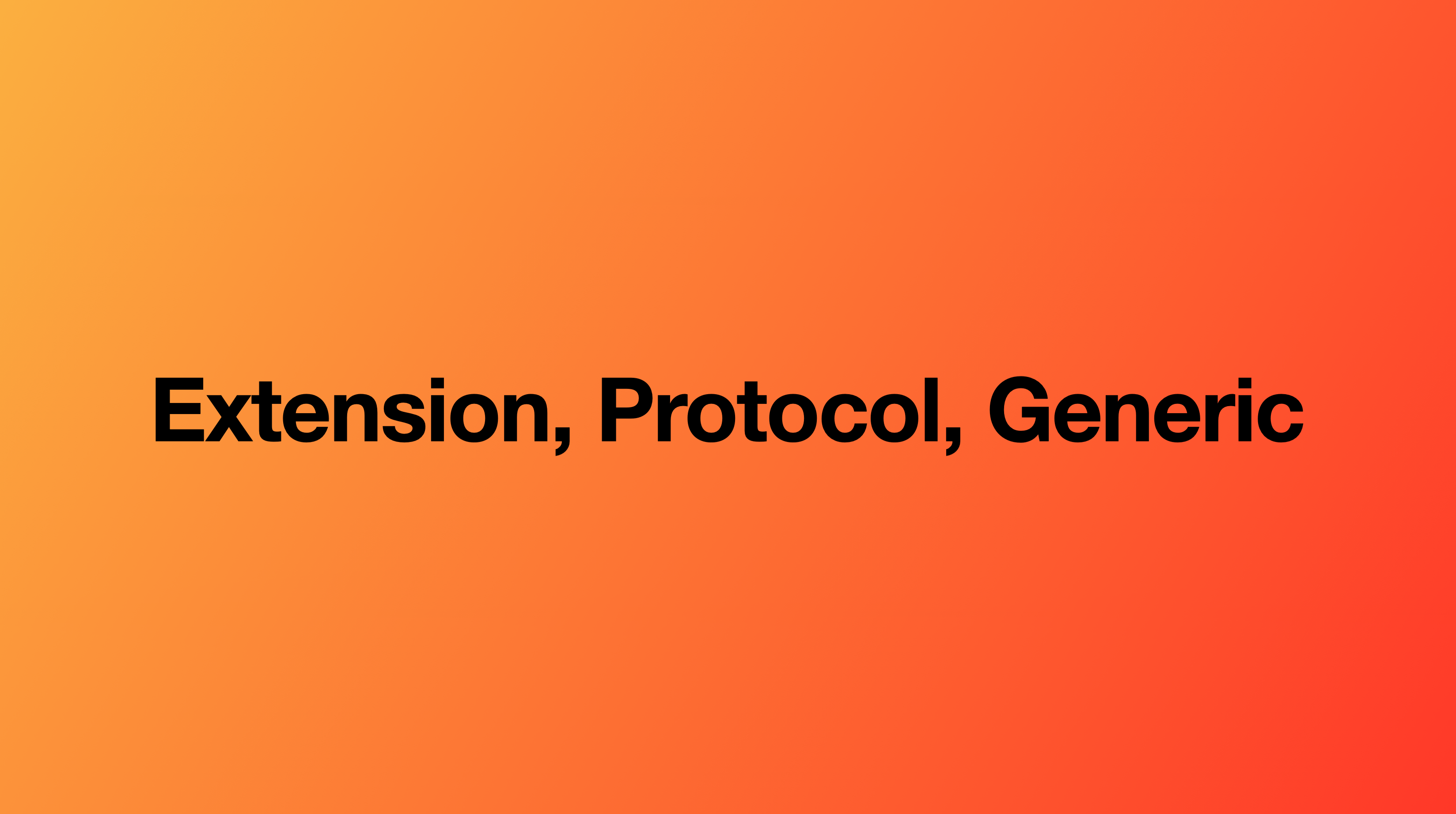
Extension과 Protocol은 Swift에서 자주 사용되는 기능이다. 값에 접근이 불가함에도 Extension으로 추가 기능을 구현할 수 있고, Protocol의 경우 POP라는 개념으로 Apple에서 밀어주는? 개념이다. Generic의 경우 코드 중복을 줄일 수 있는 좋은 기능이다. 잘 다뤄둔다면 중급(?) 이상의 개발자가 되는데 큰 도움을 줄 것이다.(~그렇게 믿고 있다 ㅜㅜ~) 그럼 시작해보자!
Extension
- class, struct, enum 확장 가능
- 원본 소스에 접근할 수 없어도 사용가능
- Objective-C의 category와 유사한 기능
- 접근제어 가능
- 가능한 것들
- computed property 추가
- method 추가
- initializer 추가
- designated intializer, deinitializer 추가 불가
- 새로운 initializer, convenience initializer 추가 가능
- 추가된 initializer에서 default initializer, memberwise initializer 호출 가능
- subscript 추가
- nested type 추가
- 특정 protocol의 confirm
- protocol 확장
Protocol
-
어떤 작업/기능을 위한 method, property의 interface 정의시 사용
-
class, struct, enum에 채택되며 그때 해당 type은 요구 사항을 구현 해야 함
-
이를 구현한 경우, type이 protocol을 준수한다고 함
-
Objective-C에 비해 나아진 점
- type처럼 사용 가능
- protocol extension을 이용하여 default implementation 가능
- 준수하는 모든 type이 추가작업 없이 확장 기능을 가짐
- protocol 기반 프로그래밍을 POP라 부름
-
예시
protocol SomeProtocol { var mustBeSettable: Int { get, set } var doesNotNeedToBeSettable: Int { get } } -
Protocol Type
- 모든 type과 동일한 동작 가능
- return type 가능
- property로 사용 가능
- container(array, dictionary etc)의 element로 사용 가능
- 모든 type과 동일한 동작 가능
-
Inheritance
- 기존 존재하는 다른 protocol을 상속받아 확장 가능
- class와 달리 multiple inheritance 가능
-
Class-only Protocol
- class에서만 사용가능하도록 제약 가능
protocol SomeClassOnlyProtocol: AnyObject, SomeInheritedProtocol { // statement }
- class에서만 사용가능하도록 제약 가능
-
Protocol Composition
-
두개 이상 protocol을 만족하는 type을 정의할 수 있음
protocol Named { var name: String { get } } protocol Aged { var age: Int { get } } struct Person: Named, Aged { var name: String var age: Int } func withHappyBirthday(to celebrator: Named & Aged) { // statement }
-
-
is,as연산자의 의미is- protocol conform시 True
asas?- protocol conform하지 않으면 nil
as!- protocol conform하지 않으면 runtime error
-
Optinal Protocol Requirement
- Objective-C에서 처럼 Optional 정의 가능
- 단, Objective-C class 상속 받은 class만 채택가능
@objcattribute 사용하여 선언@objc optional var ...@objc optional func ...
-
Protocol Constraint
- protocol을 conform할 수 있는 타입에 대한 제약을 걸 수 이씅ㅁ
where사용protocol RandomBAckgroundColorView where Self: UIView { // statement }
-
Protocol Extension
- Default function
extension RandomNumberGenerator { func randomBool() -> Bool { return random() > 0.5 } } - Default Value
extension CounterDataSource { var fixedIncrement: Int { return 0 } }- extension으로 default value를 구현해두면, 필요시에만 추가 구현하도록 처리가 가능
- 경우에 따라서
optional을 대체할 수 있음@objcattribute 지울 수 있음
- Constraint 추가
- 확장시 제약을 걸 수 있음
where사용- protocol 자체 기능 (내부에 구현되어 있는)만 이용해서 기능 확장 해야함
- 기존에 그 protocol을 준수하는 모든 type이 확장된 기능을 가지게 됨
extension Collection where Element: Equatable { func allEqual() -> Bool { for element in self { if element != self.first { return False } } } }
- Default function
Generic
-
<>안에 들어간 것을 placeholder라 함 -
function내부에서 parameter type이나 return type으로 사용가능
func swap<T>(_ a: inout T, _ b: inout T) { let temp = a a = b b = a } struct Stack<Element> { var items = [Element]() mutating func push(_ item: Element) { self.items.append(item) } mutating func pop() -> Element { return self.items.removeLast() } } -
Type Constraint
func someFunction<T: SomeClass, U: SomeProtocol>(someT: T, someU: U) { } -
Associated Type
-
protocol 정의 시 그 protocol이 사용할 임의의 type을 선언해 둘 수 있음
-
associatedtypeprotocol Container { associatedtype Item // Item이라는 type이 있을 거야~ mutating func append(_ item: Item) var count: Int { get } subscript(i: Int) -> Item { get } } struct Stack<Element>: Container { var items = [Element]() mutating func push(_ item: Element) { self.items.append(item) } mutating func pop() -> Element { return self.items.removeLast() } typealias Item = Element // associated type인 Item을 Element라 할거야: type inference로 생략가능 mutating func append(_ item: Element) { self.push(item) } var count: Int { return items.count } subscript(i: Int) -> Element { return items[i] } }
-
-
where- type parameter에 where절을 이용해서 제약 가능
func allItemsMatch<C1: Container, C2: Container>(_ c1: C1, c2: C2) -> Bool where C1.item == C2.Item, C1.Item: Equatable { }C1.item == C2.Item은 두 container의 item이 동일한 type이라는 제약C1.Item: Equatableitem이 비교 가능한 type이어야 한다는 제약
- type parameter에 where절을 이용해서 제약 가능
